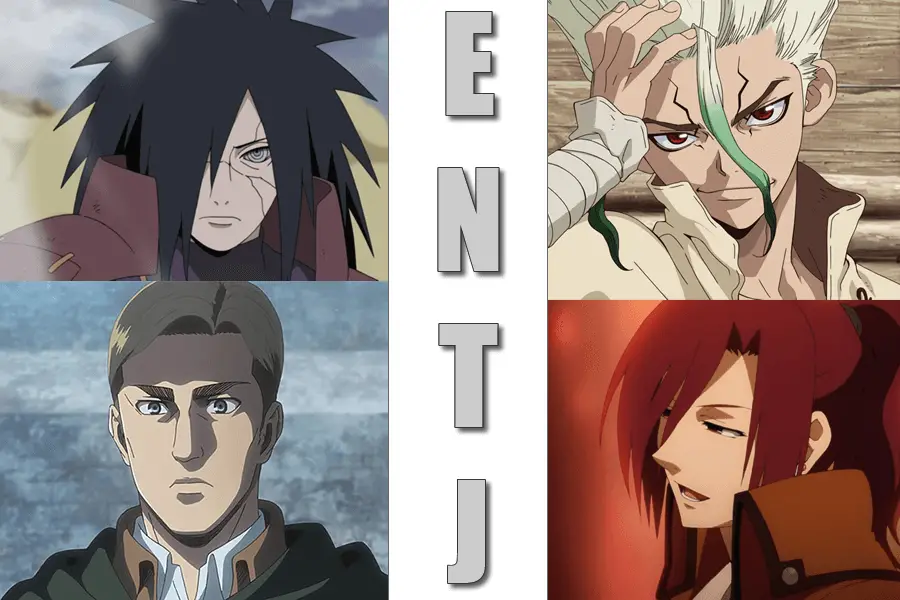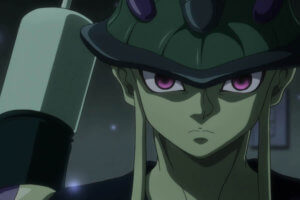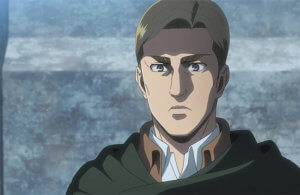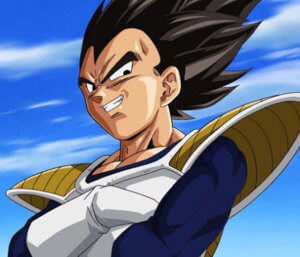7 Examples of ENTJ Anime Characters

There are plenty of examples of the ENTJ personality type within anime. Although, the ENTJ personality type is often typecast in the villain role. Although, as you will see below, that’s not always the case. As per usual with this series of articles, our goal is to demonstrate a variety of examples of each personality type within anime. Therefore, we won’t just be showing villains. Rather, we’ll be showcasing 7 distinct ENTJ anime characters, and explaining why these characters in particular stood out to us. Let us know what you think in the comments!
7 ENTJ Anime Characters
1. Madara Uchiha from Naruto Shippuden
“Love is not necessary, power is the only true necessity.”
Madara is a classic example of the ENTJ villlain. Born during a time of war, Madara desires peace, wanting to fix the world around him. He envisions a better world, one where people could reveal what’s inside of them and drink together like brothers. However, to achieve the perfect world, Madara fixates on power. At a young age, Madara determines that the way to make people listen is to amass as much power as possible. He has a naturally commanding presence, often exerting control over those around him. Once fixated on a goal, Madara easily smothers out his feelings and gives up on anything or anyone that gets in the way of achieving it.
When Madara’s initial plans don’t go as intended, Madara recalculates, forming a longterm plan that spans lifetimes. His vision initially seems unrealistic, but he carves out a way for it to happen, an elaborate plan ensuring that he would be reincarnated later to enact the final steps. Along the way, Madara adjusts to any surprises, having no issues improvising when the situation calls for it. In addition, he’s a highly competitive individual, enjoying physical challenges and the opportunity to face worthy opponents. Once revived, Madara eagerly places himself in the center of the action.
Read More about this ENTJ Anime Character: Myers-Briggs Types in Naruto: Madara Uchiha (ENTJ)
2. Meruem from Hunter x Hunter
“I shall crush that madness, and create a fair world, where the concept of inequality will be completely forgotten for all time. I don’t deny that I’ll start by using power and terror to accomplish my objective, but only when absolutely necessary and only to bring about order. You see, I have learned what true power is meant to be used for… to protect the weak, who deserve to live. That is its purpose. Power shouldn’t be used to torment the defeated.”
As mentioned, the intent is not to fill this article with ENTJ villains, but Meruem is an especially interesting case. He’s essentially an example of an ENTJ villain that goes through an identity crisis, fixating on his inferior Fi. Initially, the character is power hungry and aggressive. He heartlessly crushes everyone in his path, and enacts harsh punishments on anyone who demonstrates incompetence. However, things change when he inadvertently connects with a young girl.
Meruem laser focuses on his goal, as NTJs do. However, during a period of time, while being forced to wait for a certain event, Meruem distracts himself by training his mind via strategy games. His preferred opponent, the young girl, asks him his name, causing Meruem to realize that he has no name, only a title and authority. He starts to question not only who he is, but also his purpose and his reason for being born. This newfound obsession distracts him from his goal. Over the course of events, Meruem ends up completely shifting his perspective on power, recognizing that power is meant to protect the weak, not torment the defeated. In addition, he connects with and accepts his true feelings, rather than viewing them as a weakness that needs to be smothered out.
Read More about this ENTJ Anime Character: Myers-Briggs Types in Hunter X Hunter: Meruem (ENTJ)
3. Erwin Smith from Attack on Titan
“There are times to be strict and times to be flexible. Uphold the principles of your vows. Do what it takes to win. Follow the chain of command, and keep your eyes fixed on the path to victory.”
Erwin Smith is a remarkable leader, determined to lead humanity to victory against the Titans. (Although, secretly, his true desire is to understand the world, and perceive the secrets that are being withheld from them.) Erwin is direct and straightforward in his communication, to the point where his bluntness often scares off potential recruits. (He shares the facts, with no regard to how they’ll be received.) However, his excellent strategic mind makes the most out of the group that he gets, pushing humanity farther than it has ever gone before.
Erwin presents himself as confident and self-assured. He willingly takes calculated risk, and forms strategies around a gamble (which is something that he’s known for.) In addition, he relies heavily on hunches, and his hunches, according to others, are rarely wrong. On the path to victory, Erwin makes a lot of sacrifices, which later causes him to question himself, his actions, and his motivations. He later realizes and admits that he had played everyone (including himself) for fools, convincing them with inspiring words to fight and die for a cause, while ultimately he had fought for a selfish dream.
Read More about this ENTJ Anime Character: Myers-Briggs Types in Attack on Titan: Erwin Smith (ENTJ)
4. Vegeta from Dragon Ball
“Every time I reach a new level of strength, a greater power appears to challenge my authority. It’s as if fate is laughing at me with a big stupid grin, just like Kakarot.”
Vegeta is an example of an ENTJ that’s spends a lot of the show in a Te-Se loop. This is demonstrated by his hyper-aggressive and impulsive behavior. While Te dominants can be brash, Vegeta’s excessive power and confidence in himself leads him to act far more brash than usual, to the point of lacking any clear strategy or calculation. He fully expects to be able to brute force his way to victory and rely on his battle instincts to get him through.
Vegeta’s one and only purpose throughout the entire show is to gain power, leading to constant frustration as Goku continually remains one step ahead of him in this endeavor. Vegeta is forceful and commanding, constantly flaunting his authority and attempting to take command over those around him. The slightest show of weakness on his part, or the slightest insult, is enough to push him over the edge into a fit of rage. For the longest time, Vegeta views any kind of emotional attachment as weakness, even after starting a family. However, as his story progresses, Vegeta eventually develops loyalty and grows to care about those around him, even to the point of sacrificing himself for his family.
Read More about this ENTJ Anime Character: Myers-Briggs Types in Dragon Ball: Vegeta (ENTJ)
5. Touko Aozaki from Kara no Kyoukai
“I kill anyone who calls me a dirty red.”
Touko Aozaki is an example of an ENTJ that can be a bit of a chameleon. She willingly adapts her behavior and personality to whatever puts her at the greatest advantage or gets her what she wants. According to her, she switches her personality depending on how she views things. It doesn’t at all bother her to act inconsistent. However, Touko is extremely protective of certain aspects of her reputation, such as refusing to allow anyone to call her “dirty red”.
Touko is a no-nonsense individual, often lacking in sympathy when dealing with others. She has no problems telling people what she thinks and dominating conversations. She is shown constantly lecturing and explaining theoretical or abstract things to those in her employ. However, she’s resistant to discussing anything that she deems trivial, which can mean dismissing unlikely possibilities or being reluctant to share context that others aren’t privy to. In addition, Touko can be extremely perceptive. She often seems to know what people are thinking, and she’s adept at reading people’s intentions. Touko will answer questions that weren’t asked, or give advice about something that was never mentioned to her.
Read More about this ENTJ Anime Character: Myers-Briggs Types in Kara no Kyoukai: Touko Aozaki (ENTJ)
6. Sae Niijima from Persona 5
“Use any means necessary to win. That’s how I would deal with them.”
Technically, Sae Niijima is best observed in the Persona 5 game, but there is an anime rendition, so we’re counting it. Sae is a public prosecutor, striving to reform society. However, she’s an ambitious to a fault, willing to use whatever means necessary to be successful. As a result, overtime, she begins sidestepping rules, ignoring protocol, twisting justice, and downplaying values such as honor. At one point, she threatens to terminate someone’s parental rights based purely on speculation. Everything she does is ultimately for the sake of each case, but she can be a bit hasty or aggressive in her actions.
Sae is pragmatic and responsible. She speaks critically of her father (who had passed away some time ago) for prioritizing his “lofty sense of righteousness”, resulting in him leaving all his responsibilities on his daughters. She pushes her sister to be successful, and to focus on her future. In addition, Sae possesses an excellent intuition, which surfaces during her time interrogating the main character. She’s quick to adjust her theories to the data, fill in holes, and make assumptions based on everything she learns.
Read More about this ENTJ Anime Character: The 16 Myers-Briggs Personality Types Through Persona 5
7. Senku Ishigami from Dr. Stone
“Nothing’s achieved in a snap, dummy. It’ll take patience and hard work.”
Senku Ishigami is an example of a nerdy ENTJ. From the moment he gets turned to stone, Senku immediately evaluates his situation and enacts the best plan he can think of to deal with his current predicament. He handles the Stone Age similarily, setting goal after goal, reaching milestone after milestone, all of which are stepping stones to his final goal. Everything is connected, intertwined, and efficient. Senku doesn’t deviate from his course, or allow any distractions. He wins people over to his side via his enthusiasm for science and grandiose displays of what science is capable of. Throughout the series, he demonstrates a surprising level of adaptability. He’s good at taking advantage of unexpected situations, and using them to benefit his goals.
Senku is also an example of an ENTJ with a solid moral code. Of course, he does value facts over feelings, views relationships in a rational way, and tends to see people for their utility or capabilities. However, in spite of how he may sound at times, Senku is caring and protective, willing to go to great lengths for the sake of others, even to the point of risking his life. In addition, in spite of how things looked, Senku never considers joining Sukasa, and clearly disapproves of his actions.
Read More about this ENTJ Anime Character: Myers-Briggs Types in Dr. Stone: Senku Ishigami (ENTJ)
Other Examples of ENTJ Anime Characters: Hiei from Yu Yu Hakusho, Genkai from Yu Yu Hakusho, Videl from Dragon Ball, Kazusa Touma from White Album 2
Hi there! If you enjoyed that article, leave us a quick comment to encourage us to keep writing, and check out our Updates and Current Projects. In addition, if you've found our content helpful, please consider Buying Us A Coffee to help keep this website running. Thank you!






My inverse type! (Meaning all the introverted functions are Extraverted and vice versa…)
Reading this I thought of an ENTJ that was sort of a weird blend of some of these types: Tron Bonne! (Megaman Legends… which is a video game series not an anime. Not really helping my case with the distractibility thing.) She counts as the “Nerdy” type due to being the main inventor for the Bonne family, she counts as the villain type since the Bonne family is a family of pirates that ruthlessly steal stuff (As far as I know… I know her from her spin-off game “Misadventures Of Tron Bonnie” and Marvel vs. Capcom 3. I don’t actually know that much about the main Legends games.) and, since Videl and Kazusa are in the other examples she also counts as a love interest type since she has a crush on the hero, Megaman! (Though, she doesn’t seem to be aware of it at first… maybe due to inferior Fi?) I think her antics with the Servbots (rare ISFJ villain!) she invented are pretty hilarious, haha.
“In addition, he relies heavily on hunches, and his hunches, according to others, are rarely wrong.”
When I read this, I was wondering what it might mean if a high Ni-user does not rely on his hunches as much. Would it imply a development of Se, an Se grip state, the Ti pointing out that it’s not entirely logical to rely only on gut feelings, or something else?